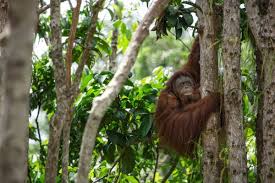There are a number of factors that threaten the viability of wild orang-utan populations. Among them are deforestation, fires, poaching and, if you can believe it, the illegal pet trade. But the greatest danger among these, by far, is loss of habitat through deforestation. In fact, as much as 80% of suitable forest habitat in Indonesia and Malaysia has been lost in the just the past 20 years (with those countries being the only two where orang-utans still live).
And why clear out the forests at such a dreadful rate? To put it simply, the answer is palm oil. Today palm oil accounts for 35% of the world’s edible vegetable oil production, with 85% of this sourced from Indonesia and Malaysia. Most is used in the food industry either as a vegetable oil or embedded in other ingredients. It seems we’ve put the damned stuff in almost everything now, and often it’s so cleverly packaged and labeled that it can be hard to know it’s there. And global demand is growing at a rate that far outpaces our ability to produce it on present acreage.
Orang-utans share 94.6% of our DNA. They, along with chimps, bonobos and gorillas, are our closest cousins. And we are making the collective choice to sacrifice them to meet our growing demand for palm oil.
It’s currently estimated that the islands of Sumatra and Borneo have wild populations of perhaps 15,000 and 57,000 respectively. While we debate the rate of decline, we do know that it’s somewhere between 3,000 and 5,000 orang-utans every year. This suggests about a decade and a half before they’re gone. But I would suggest this terrible possibility is much more imminent that that. With only a rapidly dwindling 20% of their forest home left, it seems entirely likely that we’re closing in on a tipping point. The rate of population decline is about to undergo a dramatic acceleration.
To make matters worse, as food supplies dwindle, the orang-utan’s reproduction rate slows. As it is, a female will bear offspring only every six to eight years. But then again, with nowhere to live, even this factor becomes moot.
So we have a choice to make now. Do we want a world with orang-utans? Of do we want easy access to cheap, abundant palm oil? Since we’re effectively out of time, every day we delay means the choice is made for us.
OK, so what do we do? There doesn’t seem to be anywhere near enough time to wait until public awareness is raised sufficiently that market forces alone can do their work. The problem is that even a small percentage of the eight-billion strong human population buying irresponsibly will be enough to push this species to extinction. So in this emergency, we need to be much more direct.
First – establish an effective certification system. Fortunately, we seem to be close to having accomplished that, with CSPO (certified sustainable palm oil). To qualify, the oil must have been produced “according to a set of environmental and social criteria designed to ensure the rights of local communities are respected” and that no new primary forests (or areas deemed of high value for conservation) have been cleared for palm oil production since November 2005.
Next, we don’t have time to educate everybody, but we should target growing public awareness to a level that is sufficient to have all of the big food retailers and distributors take notice. They need to believe it’s become good business to declare their commitment to buying only CSPO approved products, and agreeing to verification regimens. Government labelling laws would also need to be a part of it. And these would need to be as universally applied as possible.
The other key piece of this is full participation in conservation measures from the governments of Malaysia and Indonesia. Remember that, sadly, orang-utans don’t live in a lot of places in the wild. The islands of Sumatra and Borneo – that’s it. Effective anti-poaching would help too, though exceedingly difficult to implement in remote areas. Nevertheless, the largest part of this problem is habitat loss, and measures to combat that can be much easier to implement if there is the political will to do it. Western governments would be well-advised to be supportive of such efforts.
Then there’s the establishment of sanctuaries, for when all other measures have failed, and the option to live in the wild has vanished.
Today, somewhere between only 14% and 19% of palm oil production can be CSPO certified. We need to push that number up dramatically, and we must do it quickly. And we’re not talking about a doubling or tripling of that number. If we don’t make the overwhelming majority – 90% or more – CSPO certifiable, orang-utans will live only in zoos and sanctuaries, and wild orang-utans will exist only in the books we read to our children.
For The Orca’s Voice,
Chris and the CCA Team



Leave a Reply